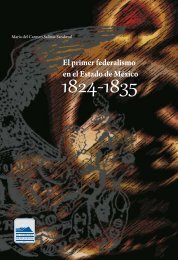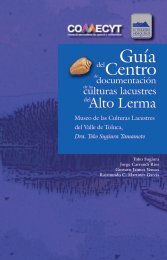You also want an ePaper? Increase the reach of your titles
YUMPU automatically turns print PDFs into web optimized ePapers that Google loves.
NICHOLE SANDERS, CATHOLIC WOMEN AND PATRIOTISM: ACCIÓN CATÓLICA MEXICANA<br />
AND WOMEN’S ORGANIZING IN WORLD WAR II<br />
Introduction<br />
In June of 1942, Sofía <strong>del</strong> Valle, founder<br />
of Juventud Católica Femenina Mexicana<br />
(JCFM), published an editorial in Juventud,<br />
the organization’s magazine, exhorting<br />
young women to support the country and<br />
be patriotic. The editorial, entitled, “The<br />
Country is in Danger,” described patriotism<br />
as being<br />
both a feeling and a debt: it is the love that<br />
the nation has for you and for each of its citizens.<br />
Patriotism is self-sacrifice that manifests<br />
itself in the obedience of laws and the<br />
completion of professional duties during peace,<br />
and during war it is the sacrifices that the<br />
country claims, or the spontaneous sacrifices<br />
one makes to serve and save the country (Del<br />
Valle, 1942a: 12).<br />
She ends the editorial exhorting young<br />
Catholic women to “prepare yourself to<br />
serve Mexico!” (<strong>del</strong> Valle, 1942a: 12). This<br />
editorial shows that <strong>del</strong> Valle hoped to<br />
persuade young Catholic women to view<br />
themselves as important members of the<br />
Mexican Catholic community, and that this<br />
membership saw patriotism and service to<br />
the country as part of the sacrifices women<br />
had to make to protect the country and be<br />
a part of this group.<br />
Questions about women and citizenship<br />
often focus on women and the vote —that is,<br />
how do women perform citizenship if they<br />
are not granted suffrage? Certainly, women<br />
fighting for suffrage in places like Mexico<br />
saw their ability to participate in politics as<br />
being very much tied to their ability to vote<br />
(Cano, 2013; Olcott, 2005). Even some Catholic<br />
women saw suffrage as key to their<br />
ability to perform citizenship. For example,<br />
some articles in the Union Femenina Católica<br />
Mexicana’s magazine saw women’s vote<br />
as central to creating a more Christian society<br />
(Espinoza Meléndez, 2020: 7-8). Many<br />
women in the newly formed Partido Acción<br />
Nacional (PAN) (García Núñez, 2017) as well<br />
as women in the conservative Sinarquista<br />
movement also viewed the vote as a way<br />
for women to help create a more moral society<br />
(Rodríguez Bravo, 2015).<br />
However, if one defines citizenship as being<br />
a member of a community, with membership<br />
providing reciprocal rights and<br />
obligations, we can begin to see how many<br />
Catholic women, particularly women who<br />
participated in Catholic lay organizations,<br />
conceived of their status in Mexico before<br />
the vote (Yuval-Davis, 1997: 69-70). Historian<br />
Vera Larisa García Núñez, argues that<br />
women organizing in the PAN understood<br />
their citizenship as a means through which<br />
to create a better society —that citizenship<br />
meant using the vote and other community<br />
work to improve Mexico (García Núñez,<br />
2017: 12). She also notes that there was considerable<br />
overlap in PAN membership and<br />
women’s membership in Acción Católica<br />
Mexicana (ACM) (García Núñez, 2017: 16-17).<br />
The women participating in Acción Católica<br />
Mexicana during World War II also understood<br />
their support of the troops as being<br />
a way to support the patria. They used the<br />
war to create a community of believers who<br />
viewed their actions as being valuable, especially<br />
in the context of the recent political<br />
exclusion of Catholics in the 1920s and<br />
30s. They believed that Catholic women<br />
could perform service in the public sphere<br />
in a way that was socially approved —women<br />
had long used charity work as a means<br />
to appropriate space in the public sphere.<br />
Participating in the war effort, however,<br />
allowed the women of ACM to support a national<br />
political goal and help shape discourses<br />
on patriotism. They used this to create a<br />
definition of patriotism based in service and<br />
grounded in morality, the family, and faith.<br />
Women were central to this definition. Their<br />
patriotism allowed them to take their charitable<br />
work and repurpose it into labor to<br />
support the war effort.<br />
Scholarship on World War Two in Mexico<br />
has largely focused on Mexico politically<br />
and economically. Works by historians such<br />
as Halbert Jones (2014) and Steven Niblo<br />
(1999) have looked at how the war allowed<br />
the state to consolidate itself politically, and<br />
other scholars, such as Rafael Velázquez<br />
164



![bicentenario_1[V2]](https://img.yumpu.com/68677971/1/167x260/bicentenario-1v2.jpg?quality=85)
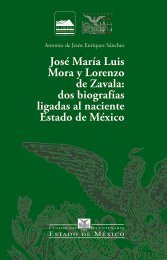
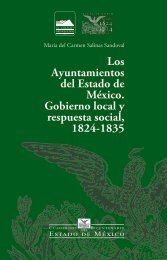
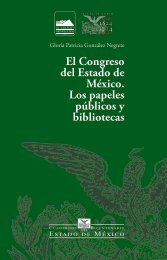
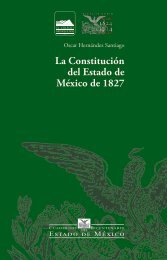
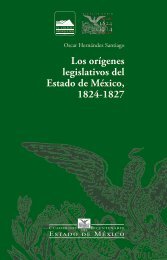
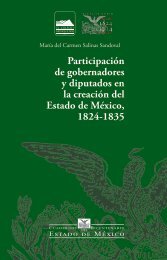
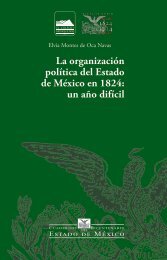
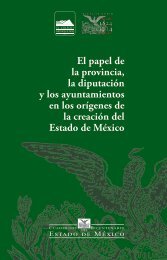

![El_primer_federalismoEM[final]_compressed (2)](https://img.yumpu.com/68483279/1/178x260/el-primer-federalismoemfinal-compressed-2.jpg?quality=85)
